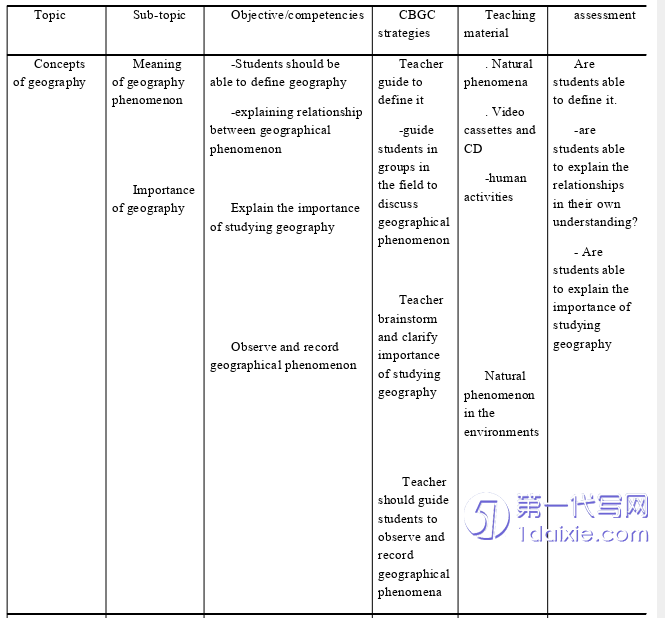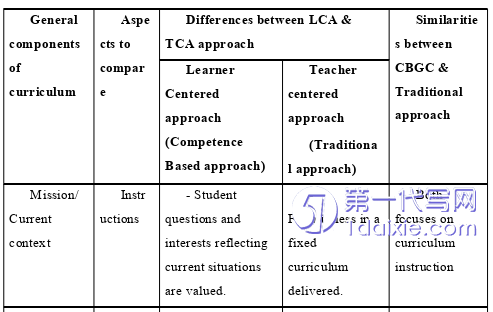本文是一篇英语论文,这项定性案例研究调查了坦桑尼亚一个地区的中学教师对实施基于能力的地理课程(CBGC)的看法和经验。在制定概念框架和分析研究结果时,研究人员采用了建构主义理论;认知建构主义(Piaget 1952)和社会建构主义理论(Vygotsky 1978)。
Chapter OneBackground of the Study
1.0.Overview
This study explores teachers'perceptions and experiences in implementing aCBGC.This chapter discusses the wide-ranging clarifications and background of thestudy to be searched.Similarly includes understanding Tanzanian geographycurriculum reform,content vs.competence-based geography curriculum,andgeography competencies to be discussed,problem statement,delimitation,theSignificance of the study,and research Questions;

During the pre-colonial Era,Tanzanian students learned by living and doing asthe education system focused on practical things.This Mwalimu Julius KambarageNyerere has stated in 1968.However,after the pre-colonial Era,Tanzania haspassed many educational changes and reforms.The curriculum changed from amalty-tribal society to German later British colonies,finally the independentrepublic of Tanganyika(Mpabanyanka A.P,n.d).After the liberation of Tanzaniain 1961 educational system changed and approved a content-based educationalsystem as an official educational approach to be followed.
1.2.Content-Based Curriculum Vs.CBGC
The content-based curriculum is an old traditional teaching approach adopted bymany African countries immediately after liberation from colonialism.The methodis commonly known as a teacher-centered approach used previously to implementthe curriculum.In contrast,a CBGC refers to the new curriculum approach'slearner-centered approach.The learning process of geographical matters is guidedby a geography teacher who acts as a facilitator,and the learners,learn accordingto their experiences,Wandela(2014)and MOEVT,(2010).However,otherresearchers defined a Competence-based curriculum as a learner-centeredcurriculum in which students must participate fully in their learning process(Schiro,2008).Due to global demand,teacher-centered methods are regarded asold traditional methods of teaching that produce students known as job seekers.Also,the contents-based(teacher-centered)approach was criticized by manyresearchers.
In contrast,a competency-based curriculum(learner-centered approach)seemsto be a modern approach that can help to prepare the future generation to take aposition in the societies and apply the knowledge and skills learned in real life.Some Researchers termed the teacher-centered approach as an approach in atraditional classroom and the learner-centered approach as an approach in the constructivist classroom,Tam(2000).In this study teacher-centered approach andlearner-centered approach differ in the following ground;
Chapter TwoLiterature Review
2.1.Brief about Content-Based Geography Curriculum
Tanzania has experienced various curriculum reforms since its independence in1961.A content-Based Curriculum was adopted as a learning approach in all subjects,including geography.It is also a case that other African countries adopted a teacher-centered approach immediately after their independence.Content-based geographycurriculum is commonly known as a teachers-centered learning approach in whichgeography teachers use lecture methods to deliver concepts to geography learners.Inthis approach,students learn directly from what is provided by their teacher.Thegeography learners remain passive;they were supposed to memorize the geographicalcontents lectured and demonstrated by their teacher.Many stakeholders andresearchers criticized the methods that do not prepare the learners to compete in thejob markets since the methods lead the learners to memorize the geography contentswithout applying geographical knowledge and skills in real life.Zyuma et al.(2020)stated that the teacher-centered approach focuses on routine learning,requiringchildren to memorize rather than expand their knowledge.The situation forced theTanzania government to review the geography curriculum,and in 2005 Tanzania decided to shift from a content-based/traditional curriculum to a competency-basedcurriculum(Kafyulilo et al.,2012.
Due to globalization,Jerald et al.(2009)stated that we need to prepare studentswith the competencies they need for the twenty-first century.Curriculum for Ordinarylevel Secondary education in Tanzania has considered social,political,and economicaspects to make students fit in society and compete in the global economy(MoEVT2007).This curriculum model shifted teaching from teacher-centered,where theteacher dominated the teaching and learning process,to learner-centered.The teacheracts as a guide which guides the teaching and learning process while learnersdominate the process.
2.2.Perspectives of the Competence-Based Geography Curriculum
The history of competence-based geography curriculum(CBGC)is not new in theworld as it has been stated to be intruded into the educational system during the early1970s when this approach of competence-based education said to be nominated forthe first time in the United States of America(Rogers et al.,2001).Competence-based geography curriculum is the new reform.The curriculum is based on a learner-centered approach as a system where the learners learn through their experiences,Chikombah et al.(1986).
Many pieces of research that explore the relationship between the schoolcurriculum and curriculum control suggest that there is a tension between theautonomous teacher as a"curriculum maker"and the curriculum control of broadersociety and economy,Apple(2004)and cited by Michell(2016).As Tanzania shiftedto the competency-based curriculum,it adopted a constructivist attitude as aphilosophy that any activity inside and outside the classroom should make the learnerbecome an active player in life and the community(Benjamin 2014).Since teachers are expected to teach the students with constructivist attitudes,they should have theappropriate skills unless they will be learners of the new approach.They willexperience some experiences from which they learn in implementing the program.Geography students should be active,as Gordon(2008)argued that the learner has tobe considered a human being,not an object that waits for a person to feed.
CHAPTER THREE METHODOLOGY......................................42
3.0 OVERVIEW.......................................................42
3.1 RESEARCH DESIGN......................................42
3.2 STUDY AREA............................................43
CHAPTER FOUR DATA ANALYSIS AND INTERPRETATION........................52
4.0.OVERVIEW................................................52
4.1.TEACHERS'EXPERIENCES IN CBGC IMPLEMENTATIONS......................52
CHAPTER FIVE DISCUSSIONS OF THE FINDINGS................................87
5.0.OVERVIEW.................................................87
5.1.TEACHERS'EXPERIENCES........................................87
Chapter FourData Analysis and Interpretation
4.0.Overview

This part describes data interpretation of the study gathered from the researchedarea.In this part,the research finding is presented by heading the central theme of theresearch questions and sub-themes of the main themes.The pieces have beendiscussed based on the views collected from the geography teachers(participants ofthe study),discussion and interpretation guided by three contexts,such as(a)teachers'experiences on implementing CBGC(b)teachers'perceptions in CBGCimplementations and(c)influence of teaching experiences to teachers'perceptions onCBGC implementations.
It aims to describe the experiences teachers encounter during CBGCimplementation.The description is illustrated by formulating themes and subthemesgenerated from an interview with geography teachers.
In the interview with geography teachers,many of them claimed somegeographical concepts and topics they were unfamiliar with.Some geography topicsare complicated,which causes teachers to lose direction in delivering geographycompetencies to the learners.Some of the subthemes have been generated from theinterview descriptions,as explained in the following ground.
Chapter FiveDiscussions of the Findings
5.0.Overview
This chapter describes the study's findings with their implications andinterconnections with other studies.The discussion will be grouped and guided bythree contexts as the significant focus of the study,it includes;(a)teachers'experiences in implementing CBGC approach,(b)Teachers'perceptions regardingwhat they experience in implementing CBGC approach,and(c)influence of teachers’experiences to their perceptions in implementing CBGC approach.Also,other partslike;Conclusion and recommendation of the study and difficulties encountered by theresearcher during the study will be described in this chapter.
It can be referred to what teachers meet once they implement the CBGCapproach as the task assigned to secondary school by the Ministry of education.TheMinistry of Education's mission is to enable students to apply geographical conceptsafter completing studying at a particular geographical level.Competences to bemeasured by the new approach include cognitive thinking,learner reasoning skills,and their capability to apply knowledge to overcome day-to-day social constraints(MoEVT 2005).The Ministry of Education emphasizes competence development,and the school exams should focus on measuring students'competencies(MoEVT2010).
reference(omitted)
